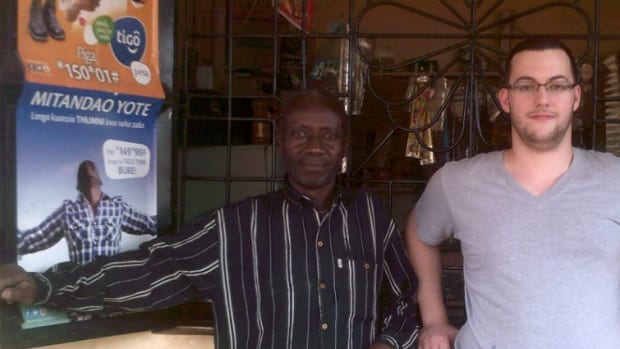Schulich grads behind innovative social enterprise providing solar energy in Africa

Schulich graduates Adam Camenzuli (iBBA ’10), Sameer Gulamani (iBBA ’10), Afzal Habib (iBBA ’10) and Michael Stock (BBA ’10) have been in the spotlight in recent months for providing high quality, affordable solar energy in Africa through their innovative social enterprise, KARIBU Solar Power. Their modular solar lamp (solar panel + rechargeable battery + light) allows consumers to enjoy the benefits of solar lighting through a “rent-to-own” program.
In November, Adam Camenzuli (iBBA ’10), Executive Director, KARIBU Solar Power, discussed why he and his Schulich classmates decided to enter the growing solar power industry in Africa in an interview with Forbes Africa:
“We were just hanging out and talking. We saw that the North America and European economies were not going to be the drivers of tomorrow’s growth. With our ties to Africa, we always talked about the next thing for the continent’s growth,” he says.
According to Adam, the cost of kerosene for the average family in Tanzania is 10 to 25 per cent of their income. But they are often the only choice these families have because even though there is a large quantity of low-quality solar lanterns coming into the market there, most families can’t afford the upfront cost.
“We realized that bringing in solar lamps was not a viable business in the long-term – we had to do something different. We had to be innovative and combine the effectiveness of pay-as-you-go, which revolutionized mobile telecommunications, with the benefits of solar technology…The ‘aha’ moment was when we realized we had to separate the components of the lamp and introduce a pay-as-you-go model through swapping the battery/light portion of the lamp,” he says.
In the article, Adam explains that the lamps are sold in Dukas, small shops in Tanzania where they sell cigarettes, soap and daily doses of kerosene.
The Karibu modular solar power lamp is divided into three components, allowing buyers to eventually purchase the lamp’s solar panel in a rent-to-own scheme.
“By selling through Dukas, you can rent the battery, and swop out a used battery. The Dukas then charge the batteries on their roofs. People pay $20 over the course of a month to rent it, around 66 cents a day. Its money they spend on kerosene, so there is no additional cost to the user. At the end of 30 days they have paid for the lamp and get to keep the solar panel. In effect, it’s a fully working lantern at 66 cents a day. The individual Duka keeps all the spare batteries. They pay a small charge for the battery and solar panel batteries can last for two years. The beauty is that you can replace individual pieces if it breaks,” says Camenzuli.
This month, KARIBU was also profiled by CBC News. In the Dec. 6th article, Adam and Sameer Gulamani (iBBA ’10), Director, KARIBU Solar Power, discussed the impact solar energy is having in Africa.
“When I talk to people about solar, when I show people solar lamps, they get so excited that it’s unreal,” said [Adam]. “I can really see the amount of impact that we can have by giving people the choice … the opportunity to choose between kerosene and solar, because right now that choice doesn’t exist in an affordable way.”
In this photo from the CBC website, Schulich grad Adam Camenzuli, the executive director of Karibu Solar Power, visits a shop owner in Tanzania who carries his company’s new modular solar power lamps
According to the article, the Schulich grads behind KARIBU don’t expect to profit from this business venture:
As a social enterprise, any profits would be funnelled back into the business to purchase more stock, pay staff a living wage, and expand their market.
The five [in addition to the four Schulich grads, Lars Bjaalie, Director of Engineering, is also part of the KARIBU team] have already contributed a lot of their own money to the project, says Camenzuli. He quit a high-paying commercial banking job in Toronto to move to Tanzania and commit to KARIBU full-time.
“We want to see that the solution reaches millions of people in Africa,” says [Sameer Gulamani (iBBA ’10)].
Gulamani, now a first-year law student at York University, has family roots in Tanzania, a country his parents left behind to come to Canada.
“They didn’t have all of the privileges that I’ve been able, fortunate enough to have in my life,” he recalls. “This project in particular [is] my way of giving back.”
KARIBU has received a lot of recognition for its innovative prototype and socially responsible thinking, reported the CBC article. Most recently, the United Nations Environment Programme lauded KARIBU with a2013 SEED award, which celebrates “social and environmental start-up enterprises [tackling] key sustainable development challenges.”
The future of KARIBU, according to the CBC article, will depend on successful financing:
With its prototype designed and business plan ready, KARIBU has managed to secure some funding from investors. A so-called angel investor that has been supportive of the team from the start gave KARIBU $25,000.
Next month, Camenzuli and Gulamani will launch an online funding campaign, hoping to raise an additional $50,000. The company will use the money to run a pilot project of the rent-to-own system in northern Tanzania.
If it is successful and they generate more investor interest, they hope to expand beyond Tanzania’s north.
“Geographically, you have to start somewhere, and that place happens to be Tanzania for us,” says Gulamani. “[But] there’s great ambition to expand this way beyond the borders of Tanzania.”